Guide to Chinese Black Tea: Lapsang Souchong, Keemun, and more
by Janelle Wazorick
November 16, 2021

You might think of blends like English or Irish Breakfast, Earl Grey, or a non-blended black tea like Darjeeling, but those teas only scratch the surface of the world of black tea.
Travel through China and among the green, white, and pu-erh teas you'll find a variety of black teas to choose from. Chinese Black Tea (or Red Tea in China) can be very strong and pungent or mild and sweet. The leaves can be big and fluffy or tiny and compact. If you love black teas or want to explore Chinese tea further, look no further than these fully oxidized teas from the birthplace of tea.
What Makes Chinese Black Teas Different?
After all, black tea is black tea, right?Absolutely not!
The black teas that are found in typical grocery stores tend to come from India, Sri Lanka, and Africa, which have their own ways of processing tea that differ from the way Chinese teas are processed. Additionally, these countries prefer to harvest tea from the Assamica variety of the tea bush (Camellia sinensis var assamica), which produces large leaves that make great hearty, malty teas.
While some Chinese tea producers use the Assamica tea bush (mainly for pu-erh), most prefer the Sinensis variety (Camellia sinensis var sinensis), which have smaller leaves that are used in production for black, oolong, white, yellow, and green teas. While there are some exceptions to this rule, Chinese black teas tend to be milder than their Indian, Sri Lankan, and African counterparts, having natural sweetness and even floral, fruity, or cocoa flavors.
Try these Black Teas!
Ready to savor a good Chinese black tea but don't know where to begin? Here are some well known Chinese black teas to try at your next tea session. Discover your next favorite tea!Black Dragon Pearls
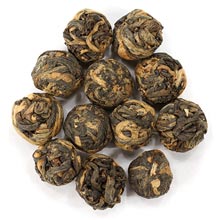
Brewing Instructions: Rather than measuring out a teaspoon of this tea, simply drop 3-4 pearls into a cup and brew in 212°F water for 3-5 minutes. This mild tea is best enjoyed plain without any additional additives.
Golden Monkey
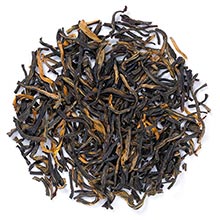
Brewing Instructions: Steep one teaspoon of Golden Monkey in 212°F water for 3-5 minutes. Some even prefer to brew this tea at a cooler water temperature, around 200°F water.
Keemun Rhapsody
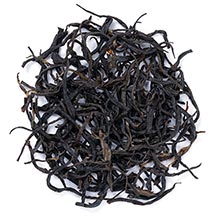
Brewing Instructions: Brew a teaspoon of Keemun at 212°F for 5 minutes. Drink plain or with milk or sweetener if desired.
Lapsang Souchong
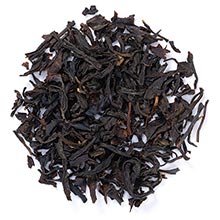
Brewing: Brew one teaspoon of Lapsang in water anywhere from 200°F to 212°F. This tea can be infused once for 3-5 minutes or infused multiple times for 30 seconds to a minute per infusion. Add milk if desired.
Yunnan Gold
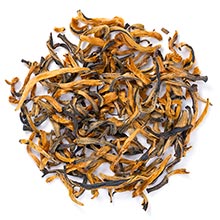
Brewing: Brew one teaspoon at 212°F for 3-5 minutes. Additionally, you can steep this tea like a green or oolong tea at 180°F - 190°F for 2-3 minutes. Experiment and find what works best for you!
Also check out the Black Teas of China sampler as well! This is for the explorer within, an introduction to the varied black teas of China. This set contains four sample sizes of loose tea. This set includes:
Yunnan Jig - Rich and savory flavor, earthy, spicy and soft, smooth cocoa mouthfeel and finish.
Pu-Erh Dante - An aged, fermented tea with a slight sweetness of figs or dates and a clean, damp earthy aroma.
Keemun Concerto - An aromatic tea with rich, toasty flavor, mineral flinty notes, and hints of smoke.
Fujian Baroque - Naturally sweet, velvety cocoa notes, deep fruitiness and glimmers of spice and softly mineral.